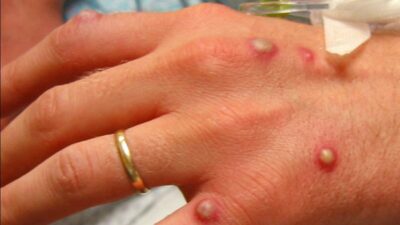The CDC COVID-19 Community Levels were just updated this past Thursday and the news is good; Chaffee County remains at a LOW level of transmission and illness. This is welcome news after the past two summers of COVID-19 surges.
But, since “there’s always something,” these days, the Coloraodo Public Health and Human Services (CDPHE) has announced that eight cases of monkeypox have been confirmed in the Denver metro area.

Eight cases of Monkeypox have been identified in Colorado. Photo by UnSplash.
All of these cases have been identified as men having sex with men, although transmission of the virus can be spread through other types of close contact. While the initial cases had recent travel and direct contact in common, there is reason to believe that there could be some level of community transmission spread because recent cases cannot trace back to close contact.
The CDPHE, along with partners statewide, has been quickly and thoroughly responding to the possible spread of monkeypox in Colorado since mid-May, setting up a testing and response structure. This past week, CDPHE administered 200 doses of vaccine to help further prevent the spread of the monkeypox virus. The vaccine comes from the federal government’s strategic national stockpile. CDPHE continues to work with federal partners to get more vaccine and testing supplies as federal supply allows.
“While there is no reason to panic, the state and local public health systems are doing what they can to plan, prepare, and respond to monkeypox which may be referred to as orthopoxvirus as the situation evolves and in future communications,” said Chaffee County Public Health Director Andrea Carlstrom. “At this time, Chaffee County Public Health is assessing local testing capacity and working on securing the vaccine once supplies become available to counties beyond the Denver metro area. As we know more, we will be pushing out information through traditional and targeted channels and sharing resources and updates with our medical community.”
The 200 vaccines are now available to men aged 18 years and older who are gay, bisexual, or other men who have sex with men who have had multiple or anonymous sex partners in the last 14 days. Anyone can get monkeypox through close contact with someone who has the virus, but epidemiological data on recent cases suggest there is a heightened risk for these groups.
Anyone who believes they have been in close contact with someone who has had monkeypox in the last 14 days also qualifies for the vaccine. These criteria are aligned with Centers for Disease Control and Prevention (CDC) guidance. To date, there have been no hospitalizations or deaths associated with these Colorado cases.
“We are doing everything possible now to slow the potential spread of the virus, and that means using the limited supply of vaccine we have. We expect demand may outweigh supply, so we are asking the federal government for more vaccines,” said Scott Bookman, division director, Disease Control and Public Health Response Division, CDPHE. “But for right now, we can’t sit on this valuable tool we have to prevent spread.”
CDPHE administered the limited supply of vaccines in the Denver metro area. Eligible, high-risk Coloradans must request an appointment online, which will include a symptom screening process where Coloradans can self-attest to their eligibility, and receive a follow-up confirmation email to schedule a vaccine appointment. Those who are unable to receive vaccination through CDPHE and think or know they have been exposed to monkeypox should contact a health care provider as soon as possible.
“Vaccination following a high-risk exposure is the best way to help prevent infection or reduce the severity of illness if someone contracts monkeypox. Post-exposure vaccination can also help slow the spread of monkeypox,” said Dr. Rachel Herlihy, state epidemiologist. “We want to make sure Coloradans have the information and resources to keep themselves and their communities safe. Our response will continue to evolve, as we expect to receive additional guidance and vaccines from the federal government.”
The JYNNEOS vaccine is a fully FDA-approved two-dose vaccine, with doses given four weeks apart. The vaccine can help keep people from getting sick at all if they receive it within four days of exposure to the monkeypox virus. If they get the vaccine between four and 14 days after exposure, it can help prevent severe illness but may not completely prevent infection.
Monkeypox may begin with flu-like symptoms that can include fever, headache, muscle aches, swollen lymph nodes, and exhaustion. Typically, a rash or skin bumps develop within one to three days after the onset of fever, often beginning on the face, then spreading to other parts of the body. Monkeypox can look like syphilis, herpes, blisters, or even acne.
In recent cases, additional symptoms have not always occurred before the rash or bumps (if they have occurred at all. Coloradans should contact a health care provider and avoid physical contact with others if they think they have been exposed to monkeypox or are experiencing symptoms.
For more information, visit cdphe.colorado.gov/monkeypox.








Recent Comments